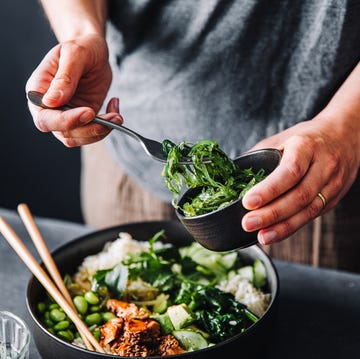Famous for being all-star toast-toppers, chip-dippers and salad mix-ins, avocados are so delicious and versatile you may be tempted to eat them every day, but is that healthy? The answer depends on your individual needs and goals, according to Gerri French, MS, RDN, CDE, a nutritionist in Santa Barbara, California.
Avocado nutrition
Described by French as a "wholesome food with lots of merit,” this popular fruit is grown in warm climates like Florida, Mexico and California, and is usually in season late spring through late summer. Despite having over 500 different types of avocado, the Hass variety is likely what you’ll find in the grocery store. Here's what you'll get in one peeled avocado:
- Calories: 322
- Fat: 29 g
- Fiber: 14 g
- Carbohydrates: 17 g
- Protein: 4 g
Is it safe to eat avocado every day?
Yes, the numbers above make it look like avocados contain a lot of fat. However, they are rich in monounsaturated fats, which are considered healthy — especially for your heart. In fact, researchers from Harvard’s T.H. Chan School of Public Health found those who ate the equivalent of one avocado per week had a 16% lower risk of cardiovascular disease and a 21% lower risk of coronary heart disease compared to those who didn't eat any. They also discovered that people who replaced half a serving of margarine, butter, egg, yogurt, cheese or processed meats with the same amount of avocado every day had a 16 to 22% lower risk of heart disease.
What's more, avocados have a low glycemic index if you’re monitoring your blood sugar. Interestingly, a 2023 study found those who had eaten avocado 2 days prior to the beginning of the study had a 20% lower risk of developing diabetes over 6 years than people who didn't eat avocado. People who were diagnosed with prediabetes and ate the avocado before the study had a 31% lower risk of developing full-blown diabetes in the 6-year follow-up.
Avocados are also packed with other nutrients such as folate, vitamin B6, vitamin C, vitamin K, manganese, copper, zinc, sodium, potassium, phosphorus, magnesium, iron and calcium. Avocados contain carotenoids such as beta-carotene (an antioxidant known to protect against some cancers and heart disease) as well as lutein and zeaxanthin (which are important for eye health, and preventing eye disease such as macular-degeneration).
Overall, French says "it’s okay for just about everyone to eat avocado every day, just not three avocados a day.” She recommends replacing a processed food you eat regularly with avocado.
That said, there are certain conditions when individuals should not eat them every day. “Anyone with kidney issues might need to watch the potassium and people on lower-fat or lower-calorie diets should keep portions in check,” says Brooke Loewenstein, RD, CND, a nutrition expert in New York City. In those cases, it's smart to be extra mindful of how much avocado you're eating.
How to eat avocado
First, make sure it's ripe: Give it a squeeze and a little give, with a dark green skin, means it's good to eat. If it’s hard as a rock, simply put the avocado in a paper bag, and place it on your window sill or your counter for a few days, and it’ll ripen right up.
The next step is to cut it up, which requires a bit of finesse. Begin by slicing the avocado in half, lengthwise and carefully take out the pit. Then, use a spoon and scoop out the flesh of the avocado, and place on a cutting board. Finally, slice up the avocado into your desired thickness.
- In salads: Drizzle lemon juice on a fresh slice, sprinkle it with salt and pepper and then toss into your salad.
- In salsa: French enjoys eating avocados chopped up and mixed with beans, corn and tomatoes.
- On toast: Mash up your avo and then add seasonings like lemon pepper, garlic salt or cajun seasoning and spread it on your favorite bread.
- In smoothies: Blend avocado with leafy greens, a little fruit juice and water for a flavorful on-the-go smoothie.
- Grilled: Put slices on the grill and then top off your chicken.
- Baked: Bake avocados stuffed with a ground meat and cheese combo.
French offers this caution though that while avocado is a nutritional choice, “the company that it keeps can be the problem.” In other words, think about what you’re pairing it with. For example, adding avos to your fave salad, but then drowning it with processed salad dressing is not so healthy. Guacamole is another example. While guacamole is healthy, overeating chips with it every day is not.
The bottom line
The takeaway from the experts and from research is pretty clear: Avocados are fine to eat every day, with a caveat. “Just because something’s healthy doesn’t mean more is better. Sticking to around ⅓ to ½ an avocado keeps things balanced without going overboard on calories or fat,” says Loewenstein. So whether you slice it, dice it, blend it, mash it, grill it, bake it or fry it, avocado can be a healthy addition to most eating plans.
Laura Iu, R.D., is a registered dietitian nutritionist, certified intuitive eating counselor, yoga guide, and owner of Laura Iu Nutrition, a private practice in New York City. She earned her Bachelor of Science in Nutrition and Dietetics from New York University and completed her internship in dietetics at Weill Cornell & Columbia Medical Center of New York-Presbyterian Hospital. She went on to work in New York City’s top hospitals, including Mount Sinai Hospital and NYU Langone Health. She believes that true health is all encompassing — physical, emotional, and mental wellbeing — not an external measure via shape or size.














